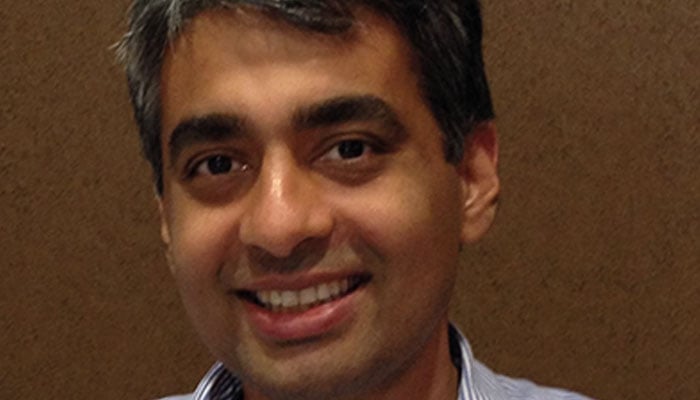Pakistani included in top 40 analytical scientists
Dr. Farooq, who is the son of the late Dr. Abdul Wahab, former vice chancellor of the University of Karachi, is currently working as a research engineering scientist in the department of chemistry and biochemistry at the University of Texas in Arlington, United States of America (USA).
A Pakistani scientist, Dr. Muhammad Farooq Wahab, has been included in the 2018 Power List of a British magazine, The Analytical Scientist. The list contains names of 40 young scientists whose accomplishments have made waves in analytical sciences.
Dr. Farooq, who is the son of the late Dr. Abdul Wahab, former vice chancellor of the University of Karachi, is currently working as a research engineering scientist in the department of chemistry and biochemistry at the University of Texas in Arlington, United States of America (USA).
One of the proposers of Dr. Farooq for the list remarked, “He is a brilliant young research scientist – few have his ability to formulate experiments to better understand chromatography and separation science”.
According to the magazine, the young Pakistani scientist achieved the world’s fastest separations in 0.5-1 cm homemade columns and developed ‘peak processing’ mathematics that allows chromatographers to operate columns above their peak-capacity, reducing long separations to a few seconds with intact quantitative information even when peaks partially overlap.
Dr. Farooq did his Masters in chemistry from the University of Karachi winning five gold medals. He later obtained his Ph.D from the University of Alberta in Canada and has been working at the University of Texas for the last several years.
This 2018 Power List has been published by The Analytical Scientist in its October 2018 edition. The 40 analytical scientists in the list were selected from all over the world, including USA, United Kingdom, Canada, Germany, Japan, France, Italy, Netherlands, Brazil, Taiwan, Malaysia, and Luxembourg.
-
 Katie Price Seen With New Hubby Lee Andrews Weeks After Tying The Knot
Katie Price Seen With New Hubby Lee Andrews Weeks After Tying The Knot -
 Biggest Order Yet Issued Against Andrew Mountbatten-Windsor: King Charles You Have To’
Biggest Order Yet Issued Against Andrew Mountbatten-Windsor: King Charles You Have To’ -
 ByteDance’s Seedance 2.0 Marks New Era Of Cinematic AI-generated Videos: Here’s How
ByteDance’s Seedance 2.0 Marks New Era Of Cinematic AI-generated Videos: Here’s How -
 Struggling With Obesity? Here's How To Manage It
Struggling With Obesity? Here's How To Manage It -
 How Epstein Scandals Are Impacting King Charles’ Healing As Stress Refuses To Relent: ‘Could Spell His End’
How Epstein Scandals Are Impacting King Charles’ Healing As Stress Refuses To Relent: ‘Could Spell His End’ -
 Ciara, Russell Wilson Become Matchmakers For Pals?
Ciara, Russell Wilson Become Matchmakers For Pals? -
 Why Prince William Releases Statement On Epstein Scandal Amid Most 'challenging' Diplomatic Trip?
Why Prince William Releases Statement On Epstein Scandal Amid Most 'challenging' Diplomatic Trip? -
 Historic Mental Health Facility Closes Its Doors
Historic Mental Health Facility Closes Its Doors -
 Top 5 Easy Hair Fall Remedies For The Winter
Top 5 Easy Hair Fall Remedies For The Winter -
 Japan Elections: Stock Surges Record High As PM Sanae Takaichi Secures Historic Victory
Japan Elections: Stock Surges Record High As PM Sanae Takaichi Secures Historic Victory -
 Prince William, Kate Middleton Finally Address Epstein Scandal For First Time: 'Deeply Concerned'
Prince William, Kate Middleton Finally Address Epstein Scandal For First Time: 'Deeply Concerned' -
 Kim Kardashian Promised THIS To Lewis Hamilton At The 2026 Super Bowl?
Kim Kardashian Promised THIS To Lewis Hamilton At The 2026 Super Bowl? -
 Andrew Mountbatten-Windsor Throws King Charles A Diplomatic Crisis
Andrew Mountbatten-Windsor Throws King Charles A Diplomatic Crisis -
 Barack Obama Hails Seahawks Super Bowl Win, Calls Defense ‘special’
Barack Obama Hails Seahawks Super Bowl Win, Calls Defense ‘special’ -
 Pregnant Women With Depression Likely To Have Kids With Autism
Pregnant Women With Depression Likely To Have Kids With Autism -
 $44B Sent By Mistake: South Korea Demands Tougher Crypto Regulations
$44B Sent By Mistake: South Korea Demands Tougher Crypto Regulations




